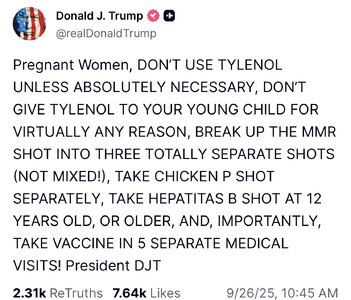ChapelHillSooner
Iconic Member
- Messages
- 1,068
That first paragraph really hits home for me.But the anecdotes about non-verbal kids in studies using folate quickly becoming able to verbalize has a lot of parents of nonverbal autistic kids, in particular, desperately hoping this is a magic bullet, at least for some.
“… A key breakthrough in 2004 was the discovery that some children with autism-like symptoms had a condition that blocks folate transport into the brain — even if their blood folate levels are normal. Frye estimates that up to 70 percent of those with autism may have a gene variation that would make them susceptible to this problem.
… Frye, director of research at the Rossignol Medical Center in Phoenix, hypothesized that leucovorin might be able to help, and he and his colleagues launched double-blind placebo-controlled trials that were funded in part by the National Institutes of Health and Defense Department. They involved children who took a twice-daily pill version of leucovorin.
The extent of the effects surprised even Frye. In his first study of 44 children with 12 weeks of treatment, 67 percent of those who took the drug saw improvements in receptive and expressive language.
… Larger trials of the drug have been slow to launch because of funding challenges, Frye said, as its original patents — dating back to its 1952 approval — have expired, leaving pharmaceutical companies with little financial incentive to support further research.
…
The initial step to obtain the pills typically requires a blood test that detects autoantibodies — proteins created by the immune system that attack healthy tissue — blocking a receptor essential for transporting folate into the brain. Those who test positive are significantly more likely to respond to treatment, and those who have positive outcomes tend to follow similar patterns.
Kimberly Baldridge’s son, Ryan Jr., was 6 when he began the medication after several other unsuccessful efforts. At the time, his only form of communication was echolalia — repeating what others said. “They’d say ‘hi buddy,’ and he’d repeat ‘hi buddy,’” said Baldridge, who is from St. Louis.
But after starting the drug, “he was pinpointing a conversation back and forth.”
“It seemed like before he was lost in outer space, and this medication I feel like brought him into fully being present,” she recalled.
Now 8, Ryan has started second grade in a mainstream school.
His parents say he still has autism — he can become dysregulated, struggles with eye contact at times and remains fixated on airplanes — but they are confident in his future.
… “I don’t think it’s a magic pill,” his mother said. “I don’t think a child who couldn’t talk is suddenly going to recite Shakespeare and talk politics, but what we’ve seen is a more gradual change, and for our son, that change has changed his whole life.”“
Gosh if only my son could have the experience of this kid.







